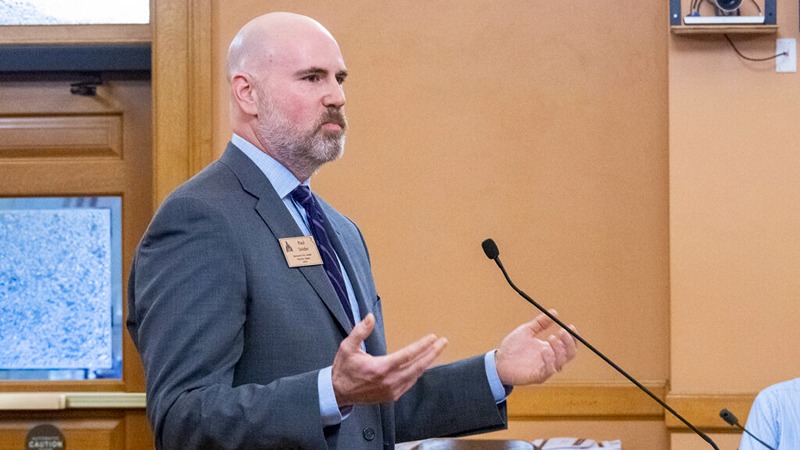By Tim Carpenter, Kansas Reflector
TOPEKA, Kan. — A Spirit AeroSystems executive pleaded with the Kansas Senate to dramatically reform membership and operations of the Kansas Corporation Commission based on an assertion the three-member regulatory body was beholden to interests of utility companies to the detriment of consumers.
Sam Sackett, representing the Wichita manufacturing giant that stands as the largest private-sector employer in Kansas, said time had come for lawmakers to overhaul the electric and natural gas regulatory commission. Under state law, governors nominate KCC members and the Senate possesses confirmation power. That would change under Senate Bill 88, a reform measure introduced by Kansans for Lower Electric Rates.
“Please don’t be content with our current regulatory framework,” Sackett said. “It doesn’t work for ratepayers. Again, all ratepayers, not just one class. Leaving the status quo is a vote of confidence in our current system, and it needs reform. The current regulatory structure is unable … or unwilling to better manage rates.”
He said industrial, commercial and residential ratepayers didn’t have access to competitive electric rates available to consumers in other states in the Midwest. He said the cost differential was a significant issue for Spirit AeroSystems and by extension for 11,000 employees at one of the world’s largest manufacturers of commercial airplane fuselages, wings and other aviation components in Wichita.
Powerful reform bill
Under the Senate bill, KCC members would stand for statewide election and serve four-year terms. Those seeking a seat on the KCC would take part in partisan races with both a primary and general election. The first commissioner would be elected in 2024, the second in 2026 and the third in 2028.
The bill would forbid regulated public utilities from contributing to KCC candidates or any political action committee involve in KCC elections. The measure would move KCC staff representing consumers in rate cases to a new utilities regulation division in Attorney General Kris Kobach’s office.
This division would be required to “advocate for reasonable, affordable and regionally competitive utility rates” and would operate under a mandate to balance interests of residential, business and industrial customers. In addition, the division would be charged with eliminating corporate waste and unnecessary spending at public utilities.
The future KCC members wouldn’t be subject to the Kansas Open Meetings Act. That provision was inserted into the bill because state law forbid members of the commission from discussing KCC issues privately, because a majority of a quorum on the three-person commission would be two. To work around that law, the KCC’s general counsel has shuttled documents back and forth among the members in the office. The KCC does take final action in public session.
Sen. Robert Olson, an Olathe Republican and chairman of the Senate Utilities Committee, scheduled testimony from bill proponents Monday and Tuesday. Opponents of the bill were also expected to testify Tuesday.
Lynn Retz, executive director of the KCC, and Jeff McClanahan, director of the KCC’s utilities division, submitted written comments ahead of the Tuesday hearing to offer what was described as “neutral” testimony on the bill.
The document said formation of a utilities division in the office of attorney general was “highly likely to weaken overall utility regulation rather than strengthen it.” Statehouse discussion about moderating utility rates hasn’t taken into consideration the
impact of lowering rates on reliability of power systems, the document said.
“Elected commissioners may not be the answer that the proponents to SB 88 are seeking,” the KCC staff testimony said. “The current appointment process seeks qualified individuals with some relevant experience for commissioner appointments.”
‘Model isn’t working’
Paul Snider, a lobbyist with Kansans for Lower Electric Rates, said 10 states elected commissioners of state utility regulatory boards. He said the Kansas bill was drawn from law in Oklahoma, where consumers of investor-owned utilities had energy rates 20% to 40% lower than in Kansas.
He acknowledged trepidation at the Capitol about altering the regulatory administrative body, but argued KCC’s record offered persuasive evidence of need for change.
“Our contention is the KCC is aligned with utilities,” Snider said. “We’re in a tough spot here. We once had rates that were below the regional average and now we’re much above that. It’s clear the regulatory model isn’t working. Stakeholders just don’t believe they’re getting equal footing when they deal with the commission.”
Snider pointed to concern about the KCC’s response to requests by Kansas utility companies to be fully compensated for the $700 million price surge in natural gas costs during the February 2021 cold snap. The KCC decided utility companies didn’t have to share the burden of an unprecedented spike, he said.
“Every single person in Kansas is going to be paying more for those gas costs over a 10-year period,” he said. “Everyone is paying, unless you’re Evergy, Black Hills, Kansas Gas, Atmos Energy and maybe a handful of others. The commission deemed 100% of the risk for high gas costs of a weather anomaly like that should fall on customers.”
He said the KCC hadn’t done anything in response to a 2018 Kansas Senate resolution mandating action to curtail retail electric rate increases.
Eric Stafford, a lobbyist with the Kansas Chamber, said the average cost of electricity in Kansas had fallen from 14th best in the nation to 32nd best. He said converting the KCC to an elective body was a step not to be taken lightly, but the scale had been heavily tipped in favor of utility companies.
“The uncompetitive position on such an important input for ratepayers has caused our members to voice strong concerns over the relationship between the regulatory agency responsible for oversight of our state’s investor-owned utilities and lack of concern over the impact their decisions have had on ratepayers,” Stafford said.























